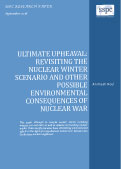The great Indian artillery bazaar: Self-reliance attempt in Indian defence
Post Bofors, there has been a reasonable ‘self-reliance’ attempt in Indian defence. To validate this assertion, let’s put it to a fundamental test—the ever-growing artillery.
Post Bofors, there has been a reasonable ‘self-reliance’ attempt in Indian defence. To validate this assertion, let’s put it to a fundamental test—the ever-growing artillery.
HAL appears to be sandwiched between politics of designers, end-users, decision-makers, media, and reality distortion attempts by large arms merchants.

This paper attempts to compile nuclear events, including weapon use and tests as well as debates surrounding nuclear winter. It also briefly discusses these devastating environmental effects in the light of a hypothetical nuclear war between two South Asian nuclear neighbours.
The rising threat from unpredictable and excessive rainfall, exacerbated by climate change, has warranted a conceptual debate for robust policy formulation. The urgency has never been felt more than now as we witness devastating incidents like dam breach in Laos, the State Deluge in Kerala (India) and frequent marooning of cities, including ‘smart cities’ in India, during monsoon. It has now become a common scenario across megacities and towns when torrential rains play havoc with daily lives of people leading to deaths and destruction of properties.
It appears India is in a perpetual search for the acquisition of fighter aircraft – an important arsenal for the Indian Air Force (IAF), which is woefully short of its sanctioned strength (39.5 squadrons). Although calculations available in public domain vary – ranging from sanctioned 39.5 to ambitious 42 / 46 squadrons for the IAF to maintain its combat edge – slightly over 30 current squadrons with fast depleting MiG fleet put the IAF in a difficult spot, despite braggart assertions from highest-level military commanders about India’s growing military aerospace prowess.
Military acquisitions often go beyond political regimes. The procurement process for the new 110 MMRCA can only be adjusted after the next regime comes to power. Any large military procurement is approved by the CCS, presided over by the PM, with the MoD as implementing machinery. The mess created over MMRCA is, therefore, attributable to the state and its bureaucracy in the first place
The maritime domain is witnessing phenomenal changes led by artificial intelligence, which have affected several facets of maritime activity including the humans that build and use these machines. One of the most notable developments is the arrival of autonomous vessels in the shipping industry, which would be crewless or semi-crewed, would navigate using onboard and offshore sensors through remote control, and discharge/load cargo using intelligent and smart machines.
Paxton ported to drupal by DropThemes.in